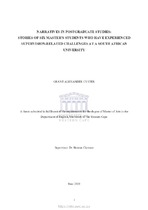Narratives in postgraduate studies: Stories of six master’s students who have experienced supervision-related challenges at a South African university
Abstract
Postgraduate research throughput and problems associated with appropriate supervision are a key
focus area for many higher education institutions around the world (Lessing & Schulze, 2012;
Amehoe, 2014; Botha, 2016). Central to this challenge is the supervisory relationship, which by its
very nature, is not one-sided. A productive and rewarding supervisory process requires that both
student and supervisor(s) are committed to fulfilling clearly-articulated responsibilities relevant to
the research project at hand (Eley & Jennings, 2005). Both student-centric and institutional factors
have been found to contribute to low student throughput and to the time taken to complete
postgraduate studies (Amehoe, 2014; Luescher-Mamashela, 2015).
In South Africa, the higher education landscape is increasingly fraught with varied challenges,
including issues of attrition and completion rates as they relate to postgraduate students. Some of
the implications of the premature termination of postgraduate research are that various academic
fields are deprived of potentially valuable research contributions, and there is a significant cost
incurred by the affected students and supervisors (Lovitts, 2001; Lessing & Lessing, 2004), as well
as the relevant faculties and institutions, and society at large. Additionally, a number of South
African universities are still grappling with inequities resulting from the Apartheid era (Pillay &
Karlsson, 2013).
It is against this backdrop that this research, through a narrative research lens involving semi-structured
interviews, explores and chronicles the stories of six Master’s students who have
encountered supervision-related challenges. According to Pearson and Kayrooz (2004), a limited
narrative research spotlight has been trained on the issue of postgraduate supervision from the
student perspective. The primary objective of this study, therefore, is to facilitate a platform through
which the six respondents are able to share the stories of their Master’s supervision experience. On
a secondary level, the sharing of these student stories has the potential to enhance the postgraduate
research experience, as Lovitts (2001) and Lessing and Lessing (2004) point out.

